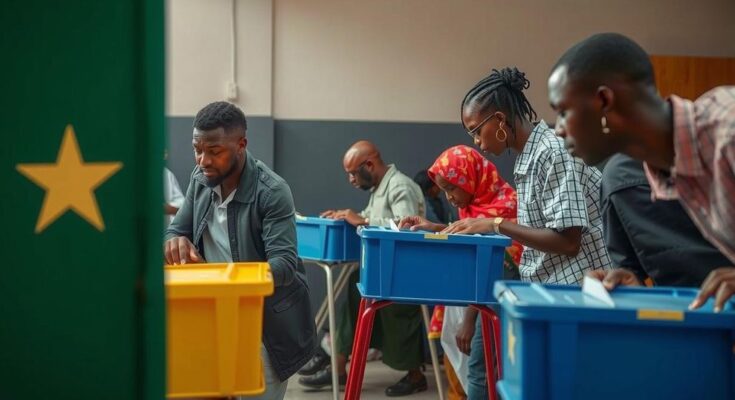Senegal votes in a parliamentary election crucial for President Faye’s reform agenda. With over 7 million registered voters choosing 165 lawmakers, Faye’s party needs a majority to proceed with promised changes. The election follows recent political unrest and reflects the youth’s discontent with current governance and economic conditions. Early results are anticipated soon, but the final count will take longer.
On Sunday, Senegalese citizens cast their votes in a parliamentary election that will determine whether President Bassirou Diomaye Faye can implement his promised reforms. With over 7 million voters deciding on 165 parliamentary seats, Faye’s party, PASTEF, currently lacks a majority. Elected in March on an anti-establishment agenda, Faye asserts that the absence of legislative support has hindered his efforts against corruption, the reassessment of foreign fishing permits, and the equitable distribution of national resources. Given the backdrop of Faye’s recent dissolution of the opposition-led parliament in September, the results of this election are crucial. The PASTEF party must secure 83 seats for majority control, and analysts predict a strong performance due to Faye’s popularity and previous electoral success. Polling stations will close at 6 p.m. GMT, with initial results expected by Monday morning, though the final count will take longer. The election has been characterized by tension and unrest; clashes between party supporters have erupted leading to significant violence. This reflects a broader discontent among Senegal’s youth, who make up over 60% of the population and are grappling with rising inflation and limited economic opportunities. As Senegal continues to navigate its political landscape, the stakes of this election highlight the yearning for change among its populace.
The parliamentary elections in Senegal are pivotal for the newly elected President Bassirou Diomaye Faye who needs legislative backing to fulfill his campaign promises. Faye was elected amidst a wave of discontent towards established political norms, having run on a platform emphasizing anti-corruption and resource management. The youth demographic in Senegal, significantly affected by economic challenges, has become increasingly vocal in demanding effective governance. This election follows a turbulent period marked by political unrest and protests, reflecting the nation’s struggle for democratic stability in a region marked by political upheaval.
The parliamentary election in Senegal is critical for President Faye’s governance and reform agenda. With a substantial youth population seeking change and facing economic challenges, the vote’s outcome will resonate beyond party alliances. The potential for unrest and political conflict underscores the need for peaceful and democratic processes in shaping the future of Senegal. As results unfold, the international community will be watching closely to assess the implications for governance and stability in West Africa.
Original Source: apnews.com




